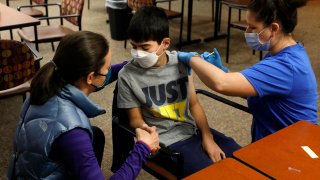
- The FDA on Friday authorized the use of Pfizer and BioNTech's Covid-19 vaccine for children ages 5 to 11.
- The move will make the shots available to 28 million kids in the U.S.
- The CDC must sign off before shots can be distributed.
The Food and Drug Administration on Friday authorized the use of Pfizer and BioNTech's Covid-19 vaccine for children ages 5 to 11, a move that will make the shots available to 28 million kids in the U.S.
The Centers for Disease Control and Prevention must sign off before shots can be distributed. It's scheduled an advisory committee meeting to review the pediatric doses next week and is expected to swiftly clear them for public distribution immediately thereafter.
Get Tri-state area news and weather forecasts to your inbox. Sign up for NBC New York newsletters.
"As a mother and a physician, I know that parents, caregivers, school staff, and children have been waiting for today's authorization. Vaccinating younger children against COVID-19 will bring us closer to returning to a sense of normalcy," acting FDA Commissioner Dr. Janet Woodcock said in a statement.
The FDA clearance – which was expected – came after the agency's Vaccines and Related Biological Products Advisory Committee voted overwhelmingly Tuesday to back a smaller dose of the Pfizer vaccine for young children.
The company said its low-dose vaccine for kids, which is a third of the dosage given to adults, is more than 90% effective in preventing symptomatic infection. It also said the shots were well tolerated in young children, producing side effects comparable with those seen in a study of people ages 16 to 25.
Money Report
Many parents say they are anxious to get their kids vaccinated with schools now open across the U.S. and the delta variant of the coronavirus driving a surge in children's cases.
As of Oct. 21, nearly 6.3 million children have tested positive for Covid since the onset of the pandemic, according to the American Academy of Pediatrics, though health experts say the number is likely much higher. Covid-19 is the eighth-highest killer of kids ages 5 to 11 over the past year, a CDC official told the FDA committee Tuesday.
As of Oct. 17, 691 deaths from Covid have been reported in the U.S. in kids under age 18, with 146 deaths in the 5 through 11 years age group, the FDA said Friday.
The number of kids deaths from Covid is at a similar level "that has prompted immunization against meningitis and other diseases of children," Dr. Ofer Levy, a voting member of the FDA's vaccine advisory panel, told CNBC. "And moreover, it's likely that the vaccine will help reduce the risk of transmission from children to older individuals."
The Biden administration has said it's already procured enough doses doses to vaccinate all 28 million 5- to 11-year-olds in the U.S., and said it is ready to roll out the first 15 million shots the first week after it's approved.
Dr. Peter Marks, the FDA's top vaccine regulator, said the U.S. is likely "a few more months off" before vaccines are authorized for kids under age 5.
"As we get down to younger children, the benefit/risk gets to be even more of a careful consideration because the youngest children are affected the least directly in terms of severe Covid-19," he told reporters during a briefing late Friday.
FDA scientists have noted the risk of myocarditis and pericarditis but said the benefits of the shots, including preventing severe disease, hospitalization and death, would generally outweigh the risk of the rare inflammatory heart conditions.
Some FDA committee members said Tuesday that vaccinating younger age groups would help the U.S. move toward Covid's "endemic" phase, where the virus is still circulating but at lower levels than it is now.
There have been more than 2,000 Covid-related school closures nationwide since August, affecting more than 1 million children and 68,000 teachers, CDC official Dr. Fiona Havers said Tuesday, citing Google News data.
Other committee members noted there are unknowns, such as the rate of myocarditis in young kids, but still emphasized that the benefits of the shots outweighed the risks.
One member wondered whether they should issue a recommendation only for at-risk children. Studies have shown otherwise healthy kids are less likely to experience symptoms from the disease even though they get infected at similar rates as adults.
A CDC analysis identified underlying medical conditions – such as obesity, chronic lung disease and neurological disorders – as risk factors for severe disease in kids. The most common underlying medical condition was lung disease, primarily asthma, the agency said.
CNBC's Robert Towey contributed to this report.
Correction: This story is updated to reflect Pfizer's vaccine was found to be more than 90% effective at preventing symptomatic infections.






